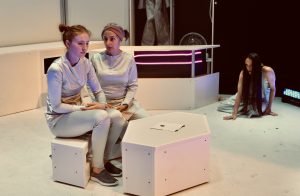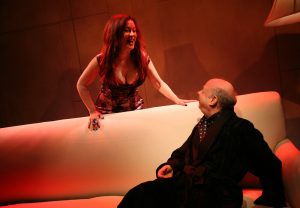
A warning before the play begins. God of Obsidian is about a “psychologically abusive gaslighting relationship.” What follows is a dark descent into one woman’s slow but steady freefall.
Alice and Nathan are walking to his home. They discuss “old gnarled Brothers’ Grimm” fairy tales. When crossing the “rickety bridge” Alice mentions that “there has to be a troll, right?” This is her first visit to Nathan’s house in the obvious early stages of a new relationship.
Inside there is a trunk which cannot be opened. The foreboding imagery is not subtle nor is the dialogue. A comment about “grinding the axe” results in an eye-rolling response: “you can grind on me all you want.” The playful banter continues but will soon change course. Nathan, in addition to being a tad goofy, is a shrewd control freak.
Cutting off ties to Alice’s friends and coworkers begins the slow roll down the hill. A series of mental torments are designed to strip away Alice’s readily apparent confidence. Nathan does seem to care for her. Caring and owning, however, are not the same thing for most people as is in evidence here.
Nathan’s gift of gab reveals itself to be truly disturbing. Over three chapters which span a few years, the mind games intensify. The verbal manipulation from Nathan’s personal viewpoints repulsively draw the listener in. What makes God of Obsidian particularly interesting is the natural believability of the situational spinning. Words and thoughts and even facts are turned upside down and inside out. The warning given is justified.
Mac Rogers’ play centers its energy on emotional distress and does not involve physical threats at all. Mr. Rogers also performs the role of Nathan and his slime factor is very, very high. The word twisting manipulations are extraordinary. As Alice, Rebecca Comtois is equally effective balancing a disappearing strength of character with nervous self-awareness. This audio play is definitely a character study in gaslighting featuring two excellent performances.
The ending seemed metaphorically heavy handed as did some of the set up. Running at just over one hour in total, God of Obsidian delivers many riveting scenes with crisply dramatic dialogue. Director Jordana Williams has layered this tale with realism which is why the story and the characters get under your skin. That is the intended effect and why this production is worth a listen.
The first part of God of Obsidian premieres August 27, 2021. The second and third parts will air over the following two weeks. This audio play is available free on demand across all major podcast platforms and the Gideon Media website.










You must be logged in to post a comment.